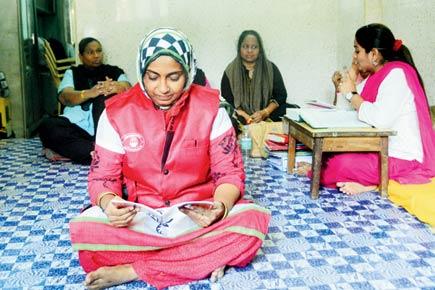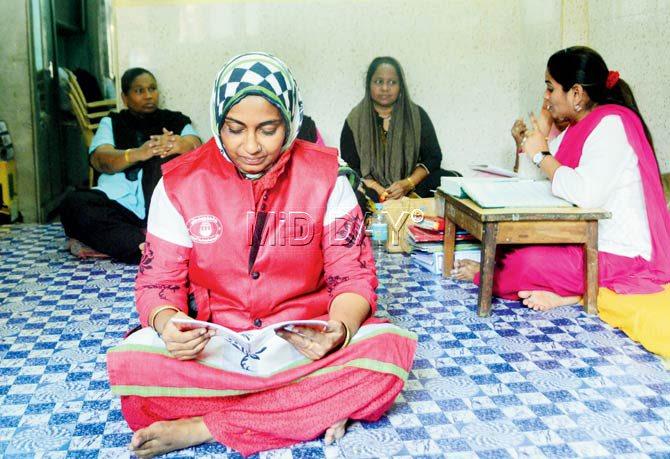What does it take to come from a community stereotyped for its shocking gender bias, and dream an unbelievable equality dream? Behrampada's Suraiya Shaikh, training to be a judge under Islamic law, a first for India, has the answer


Suraiya Shaikh at Bharatiya Muslim Mahila Andolan's Bandra East office, where she is training to be a qazi, a role traditionally reserved for men. Pics/Bipin Kokate
ADVERTISEMENT
Growing up in the narrow alleys of Behrampada, Bandra East's congested neighbourhood, Suraiya Shaikh remembers being privy to domestic squabbles that were often conducted in full public glare. But one incident is particularly etched in her memory. It was chaand raat, a time of celebration when families and friends would gather on the last day of Ramzan to spot the full moon. That night, a man stood on the terrace of their building at 2 am and shouted triple talaaq to his wife. "It was heartbreaking to hear the wife wailing, children crying on what was meant to be an auspicious occasion. At that time, even as a 10-year-old, I remember telling my father, a maulana, that what the man did was wrong. I told him that I wanted to put an end to this injustice. And, all my father said was, 'Do whatever you want when you grow up'." After all, he was aware that his daughter was the rebel among his nine children - six daughters and three sons.
Four decades later, the daughter has let the maulana's words guide her. On a sweltering Tuesday afternoon, we meet Shaikh, clad in a cotton salwar kameez with a dupatta loosely hung over her head, at the Bharatiya Muslim Mahila Andolan (BMMA) office in Bandra East's Sarvodaya Colony, where she is undergoing a year-long training that will end with her being certified a qazi.
Sitting on the floor in a room devoid of furniture, she is busy pouring over her notes jotted in a bound ruled book. "Since the Quran is in Arabic, we translate some of the duas (prayers) in Hindi so that we can help people understand the meaning of what they are reading," she says. As a teen, Shaikh owned a similar notebook where she would list all the questions that she never received answers for. "I had decided that when I die I'd ask Allah why could my brothers go to school and college while I and my sisters had to be home, why can a man ask for divorce but women can't, why can a man be polygamous but not a woman?" she says. Today, she's slowly beginning to unravel answers to her childhood conundrums. "The truth is that the Quran treats men and women as equal. But it's society's multiple interpretations that have led to a skewed understanding. Each word in the Quran has 17 different meanings."
Next to her, lies a neatly folded sleeveless red overcoat. Soon, she will don the jacket once she takes on the role of a qazi.
Shaikh is among Mumbai's first batch of female qazis - Islamic judges who oversee marriage, divorce, and other personal matters in Muslim communities. She is part of the inaugural class of 30 women from across India including Gujarat, Rajasthan, Madhya Pradesh, Tamil Nadu, Karnataka, Bihar, West Bengal and Odisha. The recently launched year-long programme, initiated by prominent activists and founders of BMMA, Zakia Soman and Noorjehan Safia Niaz, is training women to be judges, a role traditionally reserved for men. Currently, there are five women being trained to be qazis from Mumbai. The training is free of cost and follows a self-learn format. BMMA founders Zakia Soman and Noorjehan Safia Niaz are overseeing the content and syllabus.
Breaking norms
Every day, the 43-year-old reaches the BMMA office by 10.30 am to assist in handling cases of aggrieved women and go on field to get surveys done that would aid in understanding the condition of the Muslim community. A good part of the day also involves discussions on verses pertaining to women - marriage, divorce, polygamy, guardianship, a woman's role in society. During these discussions, Shaikh says she hears of bizarre cases where men would declare talaaq over SMS or WhatsApp. "There was one man who had happened to see a woman wearing the same footwear as his wife sitting in a rickshaw with another man.
He divorced her on the basis of that, when in reality, his wife was at home," she says. These incidents made her ponder over the reason behind the growing victimisation of women. "We realised that despite courts deciding matters on Muslim Personal Law, the qazis still form an integral part of the community, acting as advisors and playing a crucial role in personal matters like solemnisation of the nikah, talaaq and inheritance issues," she says, adding that when a talaaq comes up, more often than not, the male qazi takes a call based solely on the man's version. "They never hear the woman's side of the story." Traditionally, Shaikh says, the qazis have all been men, and their judgment has never been questioned. "There is a general ignorance of the Quranic injunctions. Hence, well informed female Qazis will be able to stand up for women."
As a qazi, Shaikh says her duty will be to listen to both parties. "Just because I'm a woman doesn't mean I'll favour my gender. The idea is to be fair." As a Qazi (Muslim priest), Shaikh wants to do more than just have the power to solemnise a nikah (marriage) and preside over divorce matters. "I want to counsel the women and men of my community. I want to help them resolve issues concerning their rights and ensure that they get justice, irrespective of gender."
For her, the decision to become a qazi emerged organically as she grew more involved in the activities of the organisation that has been fighting for Muslim women's rights for nearly a decade. "I had approached BMMA a couple of years ago for my sister who was then having trouble with her husband. He would beat her up. But, I liked the way they handled it amicably, speaking to both parties and arriving at a consensus." Slowly, the Naupada resident started dropping by the office often assisting them in their daily counselling cases and organising talks on gender equality for both women and men in the community. Today, she is accompanied by her mother who is also a regular at the organisation, and a silent supporter of Shaikh's feminist leanings.
"Although my father was a cleric, he was a liberal man. But as was the norm at that time, I was married off soon after completing Std X. "I protested, but they reasoned that if I didn't get married, the rest won't. Had I been as aware back then as I am today, I would have never married," she says. Today, Shaikh has two grandchildren. Back in the day, she reveals that she even contemplated leaving her husband a couple of times. "But, he never gave me a reason to leave him. He was too nice a man. He would do all the household chores," she jokes.
 Subscribe today by clicking the link and stay updated with the latest news!" Click here!
Subscribe today by clicking the link and stay updated with the latest news!" Click here!






